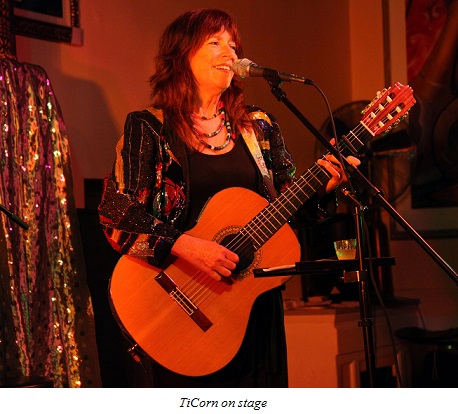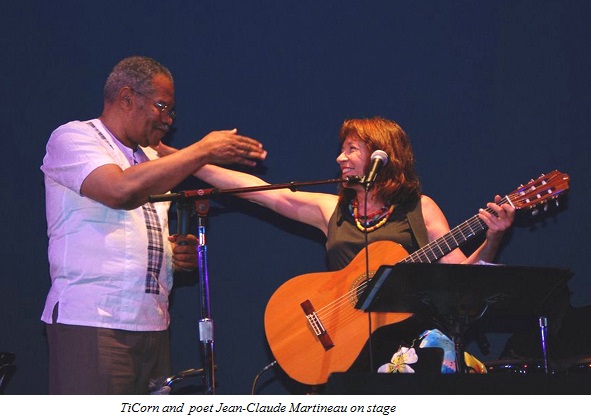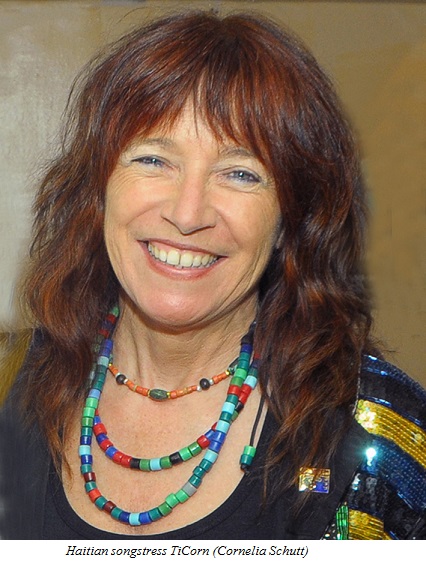CSMS Magazine
Cornelia Schutt or TiCorn, as she is lovingly called by her fans, has been in the music scene for more than 3 decades, playing a proactive role in the quest to preserve the authenticity of Haiti’s traditional music. An artist whose apparent posture shed no light about her talent as a Haitian folk singer, TiCorn has never ceased to promote Haitian values, its unique brand of folk music, its dazzling capacity to usher hope where there is none, to create bliss when it is nonexistent and to stem pride when one thinks there is nothing to be proud of.
TiCorn is the quintessential Dean of folk music, who performs with a Creole twist that music lovers everywhere can’t seem to get enough of. Few weeks ago a colleague of mine told me that anyone who is looking for the true synthesis of the Haiti’s folk music, he ought to go to Eastern Cuba to find it. I told him that may be true until he comes across the impeccable voice of TiCorn, acclaimed by many as the ambassador of this widely sought and intriguing music genre.
I was in my twenties when I had my first opportunity to enjoy TiCorn performing on stage. It was in Miami at the Joseph Caleb Center on 54th Street and 22nd Avenue, then the awesome venue for cultural rendezvous where all patriotic Haitians wanted to be. Reedy thin and tall, a white garment adorned her slender feature—arms and legs spread like a Haitian eagle while moving to the beat a gut wrenching yanvalou (rhythmic folk steps). This was quite uplifting, especially after a week of listening over the radio the picayune squabbling of exiled politicians who didn’t seem to know the way forward. “si’m te konnen, si’m te konnen, si’m te konnen ki kote n’ap prale, pou jodia nou ta vanse rive……” (If we knew where we were going, by now we should have reached destination.) Those lyrics struck a chord in my heart. Instantly, she became my idol, along with Martha Jean-Claude and Toto Bissainthe, of course.
Indeed, I was not alone. Over the years, millions have praised TiCorn and claimed her as their own. TiCorn has been nominated as one of the 15 most influential women in Haitian music in a book published by Ralph Boncy titled Les Grandes Dames de la Musique Haitienne (The Influential Women in Haitian Music.)
Last week, I was fortunate enough to reach TiCorn in Mallorca Spain where, in this dazzling conversation, she talked about her upbringing, her debut in the music industry, her hope for Haiti, her current project with Beethova Obas and renowned poet Jean-Claude Martineau also known as Koralen.
__________________________________________________________________________
AI: Bonjour TiCorn, it’s a pleasure to have you at CSMS Magazine. To begin our conversation, could you please introduce yourself to our readers?
TC: I am happy to welcome the readers of CSMS Magazine. My artist name is TiCorn. I am a Haitian singer-songwriter of German descent, who grew up in Cap Haitian, Haiti, and is now living mainly in Europe.
AI: In your biography, you say wherever you introduce yourself as a Haitian songstress, the audience often reacts with surprise. How do you overcome this?
TC: It somehow amuses me and I just leave them wondering about my identity. What counts for me is that, once I start singing, they feel the authenticity of my Creole music.
AI: I remember the first time I had the opportunity to see you on stage. It was in Miami at the Joseph Caleb Center on 54th Street. Jean-Claude Martineau (Koralen) was with you. I believe it was some time before 1986. Your filtered voice struck a chord in me. How old were you when it became clear that singing was something you could not do without?
 TC: As expressed in my song called “Music”, my love for music grew slowly but steadily. The guitar became my “best friend” when I started to take lessons at about 10 years old, and it has been part of my life since then.
TC: As expressed in my song called “Music”, my love for music grew slowly but steadily. The guitar became my “best friend” when I started to take lessons at about 10 years old, and it has been part of my life since then.
AI: What was your parents’ reaction to this choice?
TC: My parents always supported my artistic career with all its implications. They helped and encouraged me as much as they could to realize my dreams.
AI: One thing I have always wanted to ask you. What made you choose traditional folk music? Is it your patriotism?
TC: I did not purposely “choose” it. Although I enjoy singing sometimes in other languages, I always felt the urge to express myself in Creole. I love Haiti but I do not have a sentiment of old fashion patriotism to any country.
AI: I remember you played a major role in Rassoul Labuchin’s film “Anita”. Was cinema something you have always anticipated? Was “Anita” the first and only film in which you play a leading role?
TC: It was a nice challenge to play the role of “Simbi”, the goddess of the sea, in the film “ANITA”. As I preferred to sing, I composed melodies to all the lyrics of my part. It was complicated, but it was a very interesting experience. The film was presented all over Haiti. Consequently, many more people came to know me. I am still in contact with Chantal Guerrier, the girl who played the poor Restavek “Anita”. She now lives in Paris and we are both working on a concert planned for the end of November 2014 in Creil, near Paris. I also played a singing role in another film “Caribia”, but I have never considered myself as an actress.
AI: You said your family had established their business in Haiti in 1832. It was just a few years after independence. But yet you say in your biography that both parents were born in Germany. Do you mean, although your family had businesses in Haiti, they never truly turned their back on Germany? If this is true, growing up in Haiti, what was the dominant language in the house?
TC: My family were in the shipping and trading business. So they lived and traveled back and forth between the Caribbean and Germany. My parents spoke German at home, but my first language as small child was Creole.
AI: I’m assuming your mother did not speak Creole until she came to live in Haiti. Have you ever witnessed her struggle with Creole?
TC: She spoke French pretty well and learned Creole, but always kept an accent that amused us.
AI: You spoke eloquently about a woman named Anna, you Haitian nanny: … “who called me ‘TiCorn’ (petite Cornelia), a name that soon was used by all and that I have kept as my artist-name. She was a proud woman who commanded respect with her natural authority and knew how to handle me, an important person in my life. She was also a fantastic storyteller. Sitting on the dark porch at night, fascinated, I let myself be transported into her creepy world of ghosts and spirits.” Whatever happened to Anna?
TC: She was near our family as long as I can remember. It was her who immersed me in Haitian music by carrying me around on her arms singing and dancing when I was a baby.
AI: You said despite your father’s status as honorary consul of Germany, you could still feel the sense of insecurity under the Duvalier dictatorship. Did the dark years of Duvalier contribute to your choice of music? Singing for the disenfranchised?
TC: I was too young to understand the political picture but was always concerned with social issues. It is normal that those themes are reflected in my songs.
AI: Do you still work with Marcel Gilles and Jean Claude Martineau?
 TC: Unfortunately Marcel O. Gilles left us, but the beautiful song he wrote “Sous le ciel d’Haiti” (also called “Payi de rev”) will live forever in the heart of every Haitian. It has become a national hymn and is considered one of my most favorite songs. Jean Claude Martineau is a songwriter that I deeply admire since I first met him over 30 years ago. We have always kept our friendship and cooperation alive. We are just working on a wonderful CD project that unites three Haitian artists in a very unique way. Koralen (Jean Claude Martineau), TiCorn and Beethova Obas.
TC: Unfortunately Marcel O. Gilles left us, but the beautiful song he wrote “Sous le ciel d’Haiti” (also called “Payi de rev”) will live forever in the heart of every Haitian. It has become a national hymn and is considered one of my most favorite songs. Jean Claude Martineau is a songwriter that I deeply admire since I first met him over 30 years ago. We have always kept our friendship and cooperation alive. We are just working on a wonderful CD project that unites three Haitian artists in a very unique way. Koralen (Jean Claude Martineau), TiCorn and Beethova Obas.
AI: When I was a child, it was always said that you, Toto Bissainthe and Martha Jean-Claude were the voices of hope for millions of Haitians. Did you feel that way?
TC: It touches me to be named together with my two idols: Toto and Martha. For me “hope” is an essential source and energy for our future. We all need it to face the challenges of life. If my songs transport a message of hope to the Haitians, I am deeply grateful.
AI: Your first album, which I still cherish, was considered a patriotic vitamin. How do you see your role now as Haiti continues to be a deprived country?
TC: My role might be to express through music the richness of Haitian culture,with its melodious language Creole, its poetry, its mystic world and intricate rhythms. In the meantime I have published 6 CDs, all conceived in this same spirit.
AI: You speak of the opportunity of meeting Martha Jean-Claude in your biography, have you also ever had the chance to meet Toto Bissainthe?
TC: I was thrilled to meet Toto several times after her concerts. With Martha I even had the chance to share a stage in the Miami Arena. I will never forget the moving moment, when I played guitar on her songs and we sang together.
AI: Do you see a bright future for Haiti’s folk music?
TC: I think Haitian artists have a much better chance to be successful with their folk and roots music in the global music scene, than by imitating other ways of singing or performing.
AI: You also speak of a Creole songbook project. Has it been realized?
TC: Some of my songs have been published recently in Haitian songbooks by Karine Margron. I am still working on my personal songbook project. It is just a matter of time and budget.
AI: I’m sure you’re very familiar with the Haitian literature. Which of the Haitian writers do you consider your favorite?
TC: In the moment I am fascinated by two books recently published by Jean Claude Martineau: “The Arada Pledge” and “Haïti en six Leçons”. I always knew Jean Claude as an excellent songwriter, but now I discover his amazing talent as a writer.
AI: Who is your favorite Haitian singer if you have any and why?
TC: There are too many to name! Right now I greatly enjoy working with my musician friend Beethova Obas, a master of Haitian “groove”.
AI: In your “Facebook Events” page on your website, there are already 4 concerts listed for this year, but none of them will be in Haiti. Isn’t there any already planned or in the works?
TC: In March I have 2 concerts in Mallorca, Spain, and 2 concerts in Germany. There are also 2 concerts planned for France later this year. I would like to sing more often in Haiti, but it is difficult to organize concerts there, when you live in Europe. So I need people who can take care of this part and who are professionally reliable and trustworthy.
AI: TiCorn, we could chat forever. Your talent, and your fascinating story — is one that should make all of us so proud. However, like everything else in life, our conversation has reached its end. Before you go, is there any advice you’d want to give to younger generations of Haitians who might want to follow in your footsteps?
TC: I think it is wise not to look just for short term success, but to have a message and a vision. You can seek inspiration in other cultures, but do not copy and imitate. Get in touch with the essence of Haitian music. If you find your own unique musical identity, you may have a chance to stand out in the mass of great musicians and singers – but anyhow, music will surely make your life more colorful and joyful, so go for it!
AI: Thank you TiCorn. It’s been a pleasure.
TC: Thanks for giving me the chance to communicate and share. Ak tout kè’m – TiCorn
( Read more on: www.TiCorn.com , www.facebook.com/TiCornMusic and the book “Grandes Dames de la Musique Haitienne” .)
Also, more pictures of TiCorn can be found on our Facebook fan page www.facebook.com/csmsmagazine .


